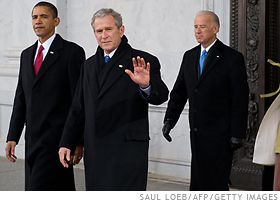In The October 2009 Issue
Media The Story Behind the StoryMuch of the news you see on TV is the work of political hit men—not journalists. And it’s only getting worse. By Mark Bowden. 
Energy The California ExperimentThe state may be a budgetary disaster, but its energy policies are a blueprint for national innovation. By Ronald Brownstein. 
Internet The Moguls’ New ClothesDon’t blame the Internet for the dismal performance of big media companies. Blame inept executives. By Jonathan A. Knee, Bruce C. Greenwald and Ava Seave. 
Technology The Green Case for CitiesForget the solar panels and the rain barrels—if you want to save energy, leave the suburbs. By Witold Rybczynski. 
Crime Mourning in ChicagoA funeral home’s business is growing, for all the wrong reasons. By Linnet Myers Burden. 
Business Why Goldman Always WinsWhat do investment bankers, wedding planners, funeral directors, and movie-trailer voice-over artists have in common? High fees for high-stakes, once-in-a-lifetime deals. By Megan McArdle. |
Featured Archive Content
Unwinding BushHow long will it take to fix his mistakes? By Jonathan Rauch 
The Rush Limbaugh story"Liberals who are used to thinking of Limbaugh as another Falwell or Buchanan should instead think of his radio program, at its best, as another Saturday Night Live." By James Fallows (May 1994) 
When was the last time a conservative talk show changed a mind?"I would agree all the more with Limbaugh if, after he returned from rehab, he'd shouted (as most Americans ought to), 'I'm sorry I had fun! I promise not to have any more!'" P.J. O'Rourke 
Bucking the HerdParents who refuse vaccination for their children may be putting entire communities at risk. By Arthur Allen 
The Great DepressionAtlantic articles from the 1930s reveal how Americans reinvented banking, restructured the economy, and dealt with challenges unsettlingly parallel to those of today 
The Drug PushersStarting in 2009, drug companies have agreed to stop giving out drug-company-branded trinkets. In 2006, Carl Elliott warned that pharmaceutical reps are wielding more and more influence—and that the line between them and doctors is beginning to blur. 
The Chicago ComplexThe roots of a city's corruption. (October 1930) 
The Balanced-Budget DebateCan it be done? Should it be done? Writings on these questions from the past seventy years. 
The World's Economic OutlookIn the midst of the Great Depression, British economist John Maynard Keynes considered the prospects for capitalism's survival. (May 1932) 
The Best Is Yet to Come"Fabulous divorce used to be the prerogative of the rich and famous, but not anymore." By Barbara Dafoe Whitehead 
First Wave at Omaha BeachCombat historian S.L.A. Marshall recalled the carnage he witnessed on Omaha Beach during D-Day. (November 1960) 
Who Needs Harvard?The pressure on smart kids to get into top schools has never been higher. But the differences between these schools and the next tier down have never been smaller. (October 2004) 
A More Perfect UnionHow the Founding Fathers would have handled gay marriage. By Jonathan Rauch (April 2004) 
The Angry American"Praise be, America's social-anger thermometer is on the rise." By Paul Starobin (January/February 2004) 
The Coming Death ShortageWhy the longevity boom will make us sorry to be alive. By Charles C. Mann 
The Royal Road to BankruptcyBy One Who Took the Ride (January 1933) 
Would Shakespeare Get Into Swarthmore?How several well-known writers (and the Unabomber) would fare on the new SAT. (March 2004) |
Recently in the Atlantic
|
Finance The Final Days of Merrill LynchThe inside story of how the government forced Bank of America to acquire the financial management giant—and its spiraling losses. By William D. Cohan. 
Profile Hollywood’s Jewish AvengerQuentin Tarantino talks about Jews, Nazis, and why his new film is so gruesome—even by his standards. By Jeffrey Goldberg. 
Policy How American Health Care Killed My FatherThe incentives that drive our health care system have perverse (and sometimes fatal) consequences. It's time for a radical change. By David Goldhill. 
Business What Would Warren Do?The Sage of Omaha has redefined the idea of value investing. But will its principles survive his inevitable passing? By Megan McArdle. 


Disasters In Case of EmergencyFEMA’s new administrator has a message for Americans: get in touch with your survival instinct. By Amanda Ripley. |
Disasters In Case of EmergencyFEMA’s new administrator has a message for Americans: get in touch with your survival instinct. By Amanda Ripley. 
Ideas 15 Ways to Fix the WorldPrivatize the seas. Welcome guest workers. Scrap the vice presidency. Teach teens to drink. And more. 
Ideas: Energy & Environment The Elusive Green EconomyBarack Obama is preaching the gospel of clean energy. Can he succeed where Jimmy Carter failed? By Joshua Green. 
Ideas: Energy & Environment Re-Engineering the EarthNew techniques can change the climate quickly and cheaply. Why are scientists afraid to mention them? By Graeme Wood. 
Ideas: Technology Get SmarterHumans have survived the centuries by evolving into quick-witted creatures. Now technology and pharmacology provide a new boost to intelligence. By Jamais Cascio. 
Profile DaredevilWilliam F. Buckley was a man of impulse, big words, and reckless candor. But he wasn’t a snob. By Garry Wills. 

|
